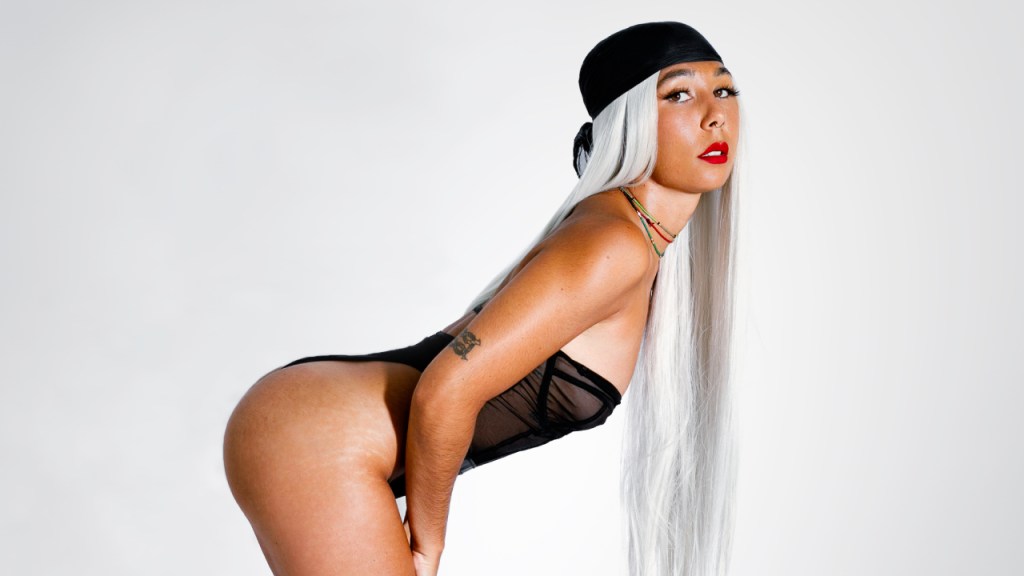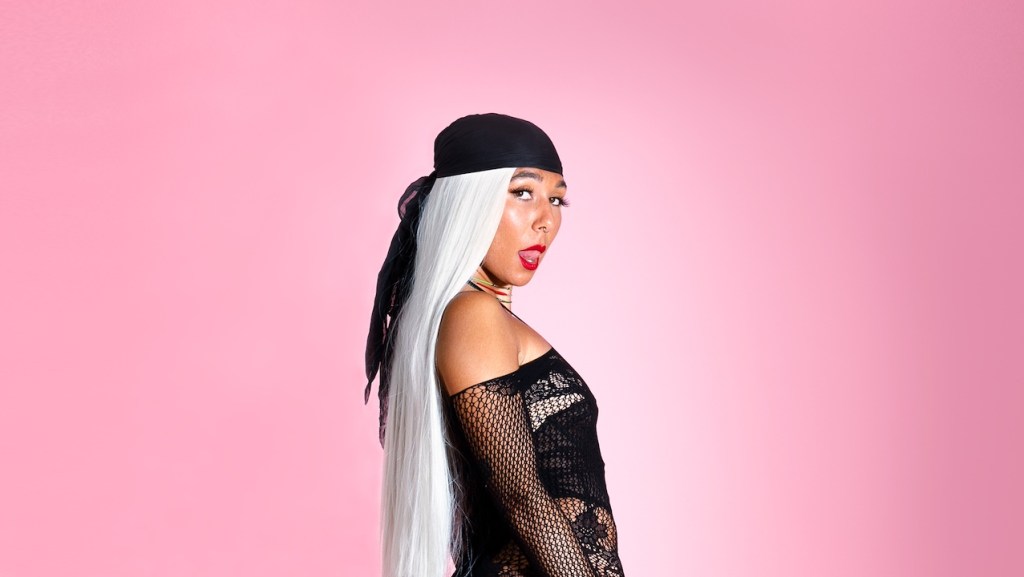Miss Kaninna’s ‘Blak Britney’ is one of the essential singles of 2023. The fired-up moment of political hip hop has shades of The Neptunes and Rage Against the Machine, but is distinguished by Kaninna’s unapologetic vocal performance.
“Government said I would fail,” she raps in the song’s first verse. “But still I prevail.” This opening salvo resonates as the 20-something Yorta Yorta, Djadja Wurrung, Kalkadoon and Yirendali woman goes on to voice her disgust at Australia’s ongoing colonial violence. “I’m a pig hater / Death to invader,” she raps. “And all the land takers / And all the treaty breakers.”
Miss Kaninna – ‘Blak Britney’
Just reading the lyrics is enough to give you goosebumps – hearing Kaninna spit them out with complete conviction is nothing short of a call to arms. Miss Kaninna’s second single, ‘Pinnacle Bitch’, picks up where ‘Blak Britney’ left off. It’s party music with fury at its core; anger rooted in dispossession and microaggressions.
Ahead of appearances at a slew of summer festivals, including Meredith, Beyond the Valley and HAYDAYS, Music Feeds chats to Miss Kaninna about her career beginnings and insistence on speaking uncomfortable truths.
Stream and purchase ‘Pinnacle Bitch’ right here
Music Feeds: What were you doing before you released ‘Blak Britney’?
Miss Kaninna: I was touring the country for a year.
MF: As Miss Kaninna?
Miss Kaninna: No, I was touring the country in The Sapphires. It was a terrible, terrible time.
MF: What character were you playing?
Miss Kaninna: I played Cynthia.
MF: Do you do any other musical theatre?
Miss Kaninna: No. I didn’t really want to be in musicals but Uncle Tony [Briggs], he heard that I was doing music because I was starting my singing career and I had videos on Facebook and stuff, so he asked me to audition for it.
MF: Had you already started writing your own songs at that stage?
Miss Kaninna: I think I’d been doing music for maybe like a year. I’d played a couple of shows here and there and had maybe four or five songs.
“I’m reminding white people that it’s a privilege to listen to Black people’s stories … you live on stolen land and you’re hearing trauma from us.”
MF: What were your earliest songs like?
Miss Kaninna: Like, you’re never going to hear them. They’re so far evolved [now], it’s not even funny. I was on my phone the other day and I was like, “Oh my god, this is the first song I ever wrote.” It’s just so, like, pop, love story – and I was so unhappy in my relationship, but I was pretending like I was [happy].
MF: So, with pop melody and structure?
Miss Kaninna: Yeah, just like intro, verse, pre-chorus, chorus, verse, pre-chorus, chorus.
MF: Were you a singer-songwriter?
Miss Kaninna: Not really. I’ve always written poems and I wrote songs by myself but this was the first time that I wrote something from start to finish. And the people I was working with at the time had a very big control over the project, which freaked me out a little bit. And so, it was just about, “How do I find people around me that will let me be creative in my own way?” rather than, “You should sing it like this.”
MF: That would strip away the love from it pretty quickly.
Miss Kaninna: Yeah, but I was just so excited that I was making songs. So I didn’t really care. I was like, “OK, sure, you can have more than fifty percent on my song. That’s totally fine.” And my mum was like, “I don’t think that’s right.” And I was like, “Yeah, yeah yeah.” And then she was like, “…no.” And I was like, “Yeah, actually, maybe this is really hectic.”

MF: When did you become Miss Kaninna?
Miss Kaninna: My name is Kaninna, but I added “Miss” on the front of it just before the summer shows – so maybe like December last year. I have an interesting relationship with my name because Kaninna is my birth name but people only know me as “Kinny” because Kaninna is too hard to say – especially in a Tasmanian town.
MF: What’s the origin of the name?
Miss Kaninna: Kaninna means little possum. It’s Aboriginal, and it was really hard for people to say. But then as I grew more into my identity after coming back from The Sapphires, I wanted my stage name to be Kaninna. You know, Zendaya has one name, Rihanna has one name; it’s such a statement.
And then I realised, being a Black girl, I really wanted to keep my identity my own as well. That’s why I don’t have my hair natural on stage. It was too personal – people think they know me. So, having a “Miss” in front of it, it makes it seem a little bit more like a character. An extreme version of the most confident version of myself. I can put the wig on and I can put that stuff on and go onstage and feel like a more exaggerated version of myself.
I’ll have my hair natural for all the mob stuff. If I ever do community work or any gigs for community, I want them to be seeing me as the most natural version of myself.
“I realised, being a Black girl, I really wanted to keep my identity my own. That’s why I don’t have my hair natural on stage. It was too personal – people think they know me.”
MF: Do you feel like that when you’re writing as well – that you’re able to access a more confident and assertive version of yourself?
Miss Kaninna: Yeah, 100%. I’m trying to build a brand about confidence and having confidence, especially Black girls having confidence. So when I do write my songs – especially doing more rap songs – I feel like I’m more creative that way when I write music.
MF: You’re such a good rapper. Your repertoire includes a bunch of neo-soul songs and a bit of a pop-rock moment, all of which feature you singing, not rapping. But ‘Blak Britney’ and ‘Pinnacle Bitch’ are really powerful hip hop songs.
Miss Kaninna: ‘Blak Britney’ was the first rap song that I wrote. And that was really interesting because I come from a singing background, and then when I wrote ‘Blak Britney’ people were like, “What the fuck?” And I was like, OK, cool, so this song is getting more attention than all my other songs.
We’re seeing all these amazing Black artists coming up, doing hip hop, and I was like, I really want to be a part of that because I can say what I’m saying in a way that people are going to dance but listen at the same time. I feel like rapping and hip hop is really good for that because you’re talking about serious issues while also people are dancing. You can’t really be like, [sings] “Fuck the government”, in a cute little neo-soul way.
MF: Has your taste changed as well? Have you become more of a hip hop fan?
Miss Kaninna: I definitely have loved women in rap for my whole life but I also listen to a lot of men in rap as well. And I suppose since actually doing rap, I don’t listen to men in rap anymore. I can’t be fucked with it. There’s nothing about it that I really enjoy – apart from, obviously, people from here and Blackfullas.
Mali Jo$e, fantastic rapper. He’s crazy, I love everything about him, he’s amazing. Teether, also. They’re all people from Melbourne/Naarm. But in regards to the bigger spectrum of hip hop, I wouldn’t say that my music taste is really men. I prefer rap with substance.
“I wouldn’t say that my music taste is really men. I prefer rap with substance.”
MF: That is evident in your work. Are you determined to get people to pay attention to what you’re saying in your songs?
Miss Kaninna: Yeah. I’ve been pretty surprised by the amount of attention ‘Blak Britney’ got because where I’m from, people don’t value Aboriginal people’s voices. So, you’ll say something, you’re sticking up for your rights, and people will be like, “Pfft. Don’t say that. You’re just being emotional, you’re being too fragile.”
It’s so interesting because I’m saying the exact same thing but I put a fucking 808 in it and they’re singing the words. So I’m kind of annoyed at that as well – I’m like, you only want to sing about it because it’s cool.
So that’s why at the live shows I’m trying to encourage Black people to come up the front and talking about privilege and reminding white people that it’s a privilege to listen to Black people’s stories, because you’re learning and you live on stolen land and you’re hearing trauma from us. You just need to two-step and enjoy it, but at the same time, you should be taking it in.
Further Reading
Miss Kaninna Shares Thumping New Single, ‘Pinnacle Bitch’
Nominees, Hall of Fame Inductees Announced for 2023 Music Victoria Awards
Christina Aguilera Headlines Program for Victoria’s ALWAYS LIVE 2023












